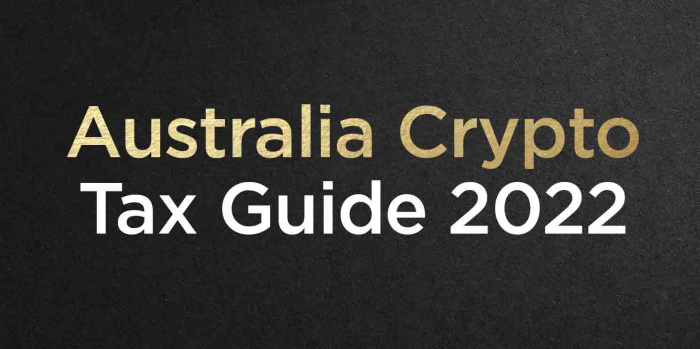
Australia Crypto Tax Guide 2022 | The Top Coins
- What is Cryptocurrency?
- How Does Cryptocurrency Work?
- AUSTRALIA AND CRYPTOCURRENCIES
- Do you have to pay tax on cryptocurrency in Australia?
- How to work out your Capital Gains Tax?
- How can you avoid CGT on cryptocurrency in Australia?
- Can the ATO track cryptocurrency?
- ATO warns cryptocurrency investors can't avoid paying tax
- Understanding the Cryptocurrency Tax Rate
- ATO Individual Income Tax Rates
- Conclusion
Are you wondering how to avoid paying income tax on cryptocurrency gains? Well, there are some things you need to learn about Australian taxation laws before investing.
Cryptocurrency is quickly becoming one of the most exciting industries in the world. From Bitcoin to Litecoin, investors from all walks of life are jumping on the crypto train.
However, due to recent changes in legislation, cryptocurrencies are now treated as property rather than currency. As such, they must be declared as capital gains when sold, which means you will owe income taxes on them.
In this guide, we'll go through everything you need to know about how to avoid tax on cryptocurrency Australia and cryptocurrencies.
What is Cryptocurrency?
A cryptocurrency is a digital asset that works as a medium of exchange using cryptography (a system for secure transactions) and blockchain technology (a distributed ledger that records transactions). It uses peer-to-peer networking and transaction clearing without an intermediary.
The first cryptocurrency was released in 2009 by the pseudonymous Satoshi Nakamoto. It was used primarily as a payment method for online purchases and other anonymous transfers in its early years. However, more people began buying and selling cryptocurrencies for their investment potential over time. Today, cryptocurrencies can be found across many different exchanges and platforms.
How Does Cryptocurrency Work?

Cryptocurrencies use decentralized networks to record transactions. It makes it possible to create a shared public ledger, called a blockchain, that keeps track of every transaction. Each block contains a timestamp and cryptographic hash of previous blocks.
When users want to send money, they generate a new address and transfer funds into it. They then add a message with details like the recipient's address and sent amount. Finally, they sign the data using a private key and broadcast it to the network.
Each node verifies the validity of the information and adds it to the chain if it passes. Once the entire network has confirmed the transaction, it becomes part of the next block. This process repeats until the last block is added, at which point the transaction is complete.
AUSTRALIA AND CRYPTOCURRENCIES
If you sell your cryptocurrency in Australia for fiat currency or another cryptocurrency, you may have to pay capital gains tax on those profits.
Capital Gains Tax (CGT) is a tax levied on any profit made from the sale of assets, including stocks, shares, real estate, and cryptocurrencies.
Capital gains tax applies only to individuals who earn taxable income. Therefore, you cannot incur CGT liability if you do not make enough income to be taxed.
Do you have to pay tax on cryptocurrency in Australia?
Yes, if you earn money from crypto trading, you must declare it to the Australian Tax Office (ATO). If you don't report this income, you could face penalties and interest charges. The ATO has published some helpful information about cryptocurrency taxation on its website.
The Australian Tax Office (ATO) has issued guidance stating that digital currencies are not exempt from capital gains tax. It means that if you bought cryptocurrency at a profit, you would owe tax on it. However, if you sold your cryptocurrency at a loss, you may be able to claim a deduction against any capital losses incurred.
How to work out your Capital Gains Tax?
A capital gain is the same for every type of asset - like a stock. When you sell an asset, you get more money than you paid for it. It is called a capital gain. Capital gains are taxed differently depending on how much profit you make.
ATO provides the following guidelines on calculating and recording your crypto capital gains: You must include any costs associated with buying or selling your cryptocurrency. These may consist of transaction fees, storage fees, and other expenses.
Cryptocurrency gains are taxed as income. Therefore, you must declare your crypto gains on your taxes.

How can you avoid CGT on cryptocurrency in Australia?
There are many ways to avoid paying capital gains tax (CGT) on cryptocurrency. The most common way is to hold it outside of Australia. It means keeping your digital assets abroad, either in a foreign bank account or a crypto wallet service like Coinbase.
Can the ATO track cryptocurrency?
If you have an account with Australian cryptocurrency designated service providers, the ATO already has some of your data. The ATO has a data-sharing program with all Australian exchanges and wallets. As a result, the ATO knows how much money you've made, how much you spend, what cryptocurrencies you use, and who you trade with.
Australians who traded crypto received a letter from the ATO nudging them to report their crypto transactions. Those who didn't notify their trades within 28 days faced fines.
Cryptocurrency is not considered a foreign currency or money by the Australian government. Instead, cryptocurrencies are classified as property and assets for capital gains tax purposes. Cryptocurrency can also be viewed and taxes as income tax. Your intentions and setup determine how you're taxed.
ATO warns cryptocurrency investors can't avoid paying tax
Cryptocurrency owners need to be aware of their tax obligations. Many changes are coming on January 1st. More tax cuts are on the horizon. Don't expect to escape taxation by hiding your assets.
Cryptocurrency gains are taxed as income, even if you don't cash them back into Australian dollars. It means that people who trade cryptocurrencies should be careful about what they do with their money.
ATO assistant commissioner Tim Lohan warns Australians that it's not a game of hiding and seek when it comes to cryptocurrency. Cryptocurrency exchanges offer excellent data matching capabilities.
Cryptocurrencies are very volatile. Prices go up and down. So people invest in them because they think they'll rise in value. But there's no guarantee that they will. And if you buy them as an investment, you may owe taxes when you sell.
Understanding the Cryptocurrency Tax Rate

Cryptocurrency is subject to capital gains taxes. Factors affecting the tax rate include the type of currency (i.e., Bitcoin or Ethereum), the amount of money involved, and whether the transaction was made for profit. Mining cryptocurrencies is treated differently than trading them.
ATO Individual Income Tax Rates
Income tax rate is nil plus 19% of excess over $18,200. $45K - $120K $5K plus 32.5% of extra over $45K. $120K - $180K $29K plus 37% of extra over $120K. $180K+ $51K plus 45% of extra over $180K.
Conclusion
Cryptocurrency has been around since 2009, but only recently has it become mainstream. Unfortunately, this means that many people are still trying to figure out how to deal with taxes on their earnings.
The good news is that cryptocurrencies are treated differently from other currency forms. For example, they're considered property rather than cash so that you won't owe capital gains tax on them.
However, you may still owe income tax on your earnings. So, if you plan on selling your crypto, you'll need to know how to calculate your taxable income.






Leave a Reply
105 comments
Add comment ×